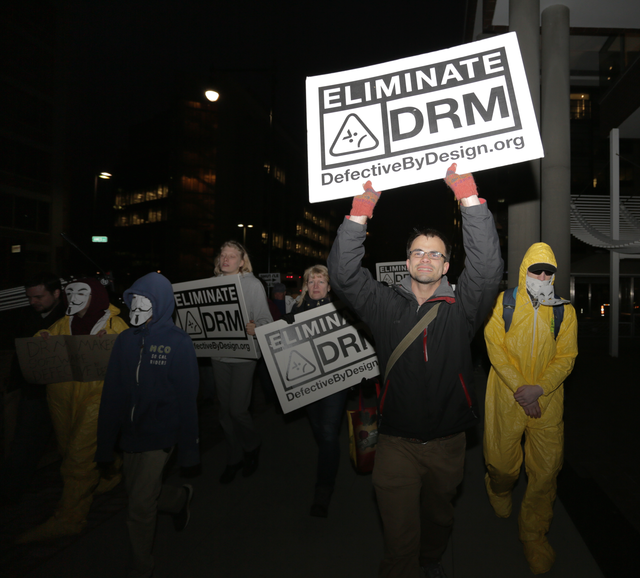mirror of
https://gitlab.com/ansol/web-ansol.org.git
synced 2025-01-23 18:43:27 +00:00
10 KiB
10 KiB
| categories | metadata | layout | title | created | date | aliases | |||||||||||||||||||||||||||||||||||
|---|---|---|---|---|---|---|---|---|---|---|---|---|---|---|---|---|---|---|---|---|---|---|---|---|---|---|---|---|---|---|---|---|---|---|---|---|---|---|---|---|---|
|
|
article | ANSOL, AEL to lead demonstration against digital handcuffs at World Wide Web Consortium meeting | 1473707744 | 2016-09-12 |
|
(Due to several requests, ANSOL is providing the English version of this Press Release. The original, in Portuguese, can be found here)
LISBON, Portugal -- Thursday, September 8th, 2016 -- ANSOL (Associação Nacional para o Software Livre) and AEL (Associação Ensino Livre) will demonstrate against the incorporation of Digital Restrictions Management (DRM) into HTML, the technical standard that defines the Web. ANSOL and AEL invite anyone interested to join them on September 21st at 18:00 at Centro de Congressos de Lisboa, during a meeting of the World Wide Web Consortium (W3C), which sets Web standards like HTML and CSS. W3C members such as Microsoft, Google, and Netflix have been pushing forward the incorporation of Encrypted Media Extensions (EME) into HTML. This would make it no longer an open standard, according to national law. EME in HTML would make it fail three of five criteria in the portuguese law for open standards (36/2011) and would unjustifiably sacrifice freedom on the Web.

"One major issue in having DRM inserted into the HTML standard, is that the DRM itself is composed of undocumented actions and processes, which means that HTML5 will not be an open standard according to national law 36/2011", says Marcos Marado, president of ANSOL, adding, "this alone would make HTML5 unviable for use by portuguese Public Administration, and other countries that, like Portugal, rightfully mandate that only Open Standards can be used."
Streaming companies like Netflix require users to run DRM -- also known as "digital handcuffs" -- on their own devices, to prevent them from performing operations those companies don't allow on digital media, even if permitted by law. "DRM is known to surveil users, endanger them by worsening security vulnerabilities, and disempower them by locking them out of their own computers", said Paula Simões, AEL president. DRM already exists on the Web, but not in a form that is formally blessed by the W3C. Technologists and digital freedom activists warn that DRM in Web standards would make it cheaper and less politically costly to impose restrictions on users, precipitating an increase in DRM on the Web.
This protest, with the support of the Free Software Foundation, will take place on September 21st, from 18:00 to 22:00, at the Centro de Congressos de Lisboa, where W3C is going to hold its meeting. The organizers welcome anyone concerned with Internet and Software Freedom to attend.
The W3C is a nongovernmental decision-making body, consisting of corporations, nonprofits, and universities. The proposed DRM addition to the HTML standard is called Encrypted Media Extensions and it is under development by a group of industry technologists working under the aegis of the W3C. It is currently a draft undergoing review and testing, but by the end of 2016 the W3C is expected to vote whether to ratify it as an official Web standard.
This year, W3C has been followed by protests against DRM. The last major W3C meeting, which took place in March 2016, was met by the first-ever demonstration at a meeting of the standards body.
Free Software Foundation campaigns manager Zak Rogoff organized the protest in March. He said: "Web users around the world are concerned about the industry scheme to create a universal DRM system for the Web. We are inspired by ANSOL, AEL, and the activists who will protest at the W3C meeting in Lisbon. We are all part of a united movement for Internet freedom and W3C cannot ignore our concerns."
Additional information:
- ANSOL: https://ansol.org/ (in Portuguese, see it's Wikipedia entry in English)
- AEL: http://ensinolivre.pt/ (in Portuguese)
- Portuguese law for Open Standards: 36/2011 https://m6.ama.pt/docs/Lei362011-NormasAbertas.pdf (in Portuguese)
- Free Software Foundation: https://www.fsf.org
- Encrypted Media Extensions: https://www.w3.org/TR/encrypted-media/
ANSOL - Associação Nacional para o Software Livre (National Association for Free Software) is a Portuguese non-profit Association that aims to spread, promote, develop, investigate and study the concepts around Free Computing and their social, political, philosophical, cultural, technical and scientific repercussions.
A Associação Ensino Livre (AEL - Association for Educational Freedom) aims to promote and use Free Software and Content, namedly in Open Access and Create Commons licenses, at an educational level, in Portugal, working with teachers, students, researchers, libraries and education institutions towards that objective.
Contacts:
ANSOL - contacto@ansol.org
AEL - admin@ensinolivre.pt